The X-rated musical became a hit

It’s 50 years since the release of Cabaret, Bob Fosse’s ground-breaking 1972 film musical set against the backdrop of the dying days of Germany’s Weimar Republic and the country’s growing support for the Nazi Party. A story of loving impossible loves and the torture of self-discovery in a world of demagogues and uncompromising hate, it has a tragic immediacy that makes it as contemporary as ever. In 2021 yet another production of the original stage musical opened in London’s West End, which has been received with acclaim and packed audiences.
More like this:
– The new Golden Age of musicals
– The masterpieces stolen by the Nazis
– The most bizarre musical ever made?
The film has its genesis in the largely autobiographical 1939 novel Goodbye to Berlin by Christopher Isherwood, who had travelled to the city in 1929 in pursuit of its vibrant gay scene. There, he lived among a crowd of misfits, who formed the basis for the likes of the ambitiously bright-eyed Sally Bowles and the provocative Master of Ceremonies, who was played by Joel Grey in the 1972 film (and who beat Al Pacino, James Caan and Robert Duvall to the best supporting actor Oscar). While sex between men was illegal there as it was in Britain, Berlin became a magnet for sex tourism and hundreds of gay bars appeared throughout the city. What Isherwood found was a country blindly barrelling into the abyss as its inhabitants drowned in decadence. Anti-Semitism was on the rise, Nazi rallies doubled, trebled and quadrupled in size and the bohemians – gay people, communists – all living like every year was their last, were soon to be purged and imprisoned in concentration camps alongside the Jews (Sam Mendes’ 1993 theatrical adaptation of the musical ended on this very grim note).
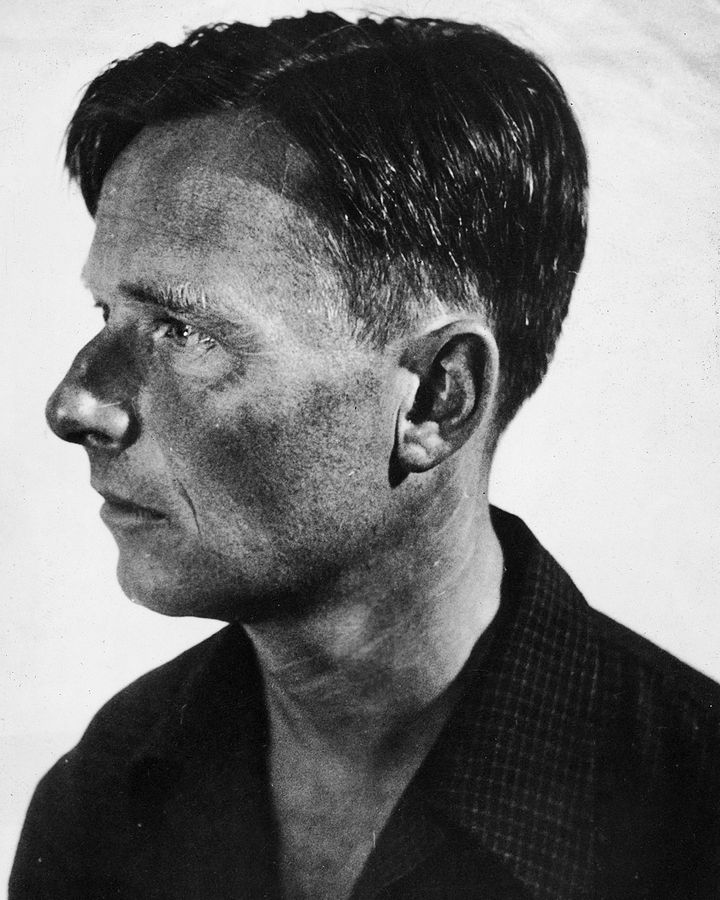
Christopher Isherwood’s 1939 novel Goodbye to Berlin was first adapted into a stage musical in 1966, before Fosse’s 1972 film version (Credit: Getty Images)
Although Isherwood could not have foreseen this future when he moved to the city, Goodbye to Berlin does not find delight in all this decadence. There’s a prescient doom that pervades the novel, which now serves as a kind of historical document detailing the conditions that allowed Nazism to triumph; a story of life on the fringes of a monumental history. Fosse’s film came six years after the stage musical had debuted on Broadway, with lyrics and music by songwriting duo John Kander and Fred Ebb and a book by Joe Masteroff. Masteroff reinterpreted Isherwood’s words into an orgiastic celebration of everything camp and debauched, heightening its homoeroticism and dimming the brutality of fascism into the background.
Fosse’s film is really a hybrid of the Isherwood novel and the original version of the stage show in the sense that it combines the latter’s extravagance with the former’s grime. It is mostly set within the bewitching confines of the Kit Kat Club – a cabaret bar that doubles as a safe space for Berlin’s outsiders who can be as liberated as they want – while the world changes irreversibly outside. Its star is Sally Bowles, a hedonistic, free-spirited-to-the-point-of-oblivious performer embodied by Liza Minnelli, in her breakout role. Probably the film’s biggest divergence from both the book and the stage musical is that the Sally of the movie is a talented singer and enchanting performer whereas she was previously depicted as ambitious but largely talentless, her mediocrity keeping her trapped in the club.
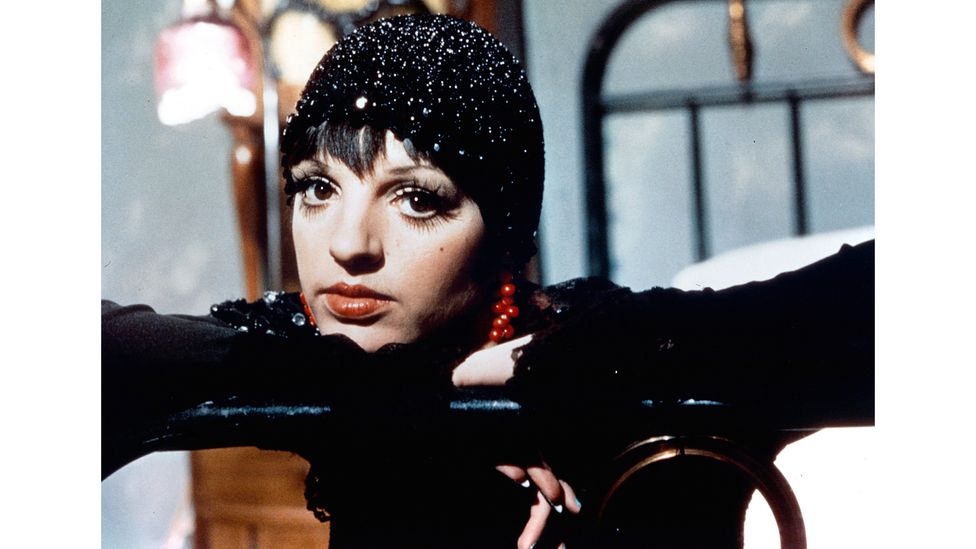
Liza Minnelli starred as hedonist cabaret star Sally Bowles – in her breakout role (Credit: Getty Images)
Due to its subject matter, Cabaret was never going to be a film that turned its gaze away from the taboos of gay sexuality and creeping fascism, but nor could it, within the context of the US moral conservatism of the time, embrace the explicitness of Isherwood’s writing. While a 21st-Century audience is more accustomed to seeing same-sex relationships on screen, Cabaret’s matter-of-fact but largely implicit depiction of queerness was ground-breaking for its time, as Dr Emmie McFadden, a film studies lecturer at Sheffield Hallam University, tells BBC Culture: “This film was released only three years after the Stonewall Riots, which was the single most important event that the led to the gay liberation movement in the US. The first Pride parade happened one year after Stonewall, and it was these two events that made positive portrayals of homosexuality on screen possible.”
Michael York, who in the film played Brian Roberts, the stuffy and slightly shocked observer of chaos and Isherwood’s alter ego, also confirms to BBC Culture that there were never any discussions about making his character’s sexuality more explicit: “We thought it was so strong to keep everything implied, sometimes that can be a better way of doing things.” The character in the film is bisexual (Isherwood was homosexual), but what is said of his orientation exists in glances and somewhat euphemistic utterances. As Stephen Tropiano, professor of screen studies and director of Ithaca College, tells BBC Culture, “homosexuality was one of the last taboo subjects in Hollywood and so few films dealt with it in explicit terms”.
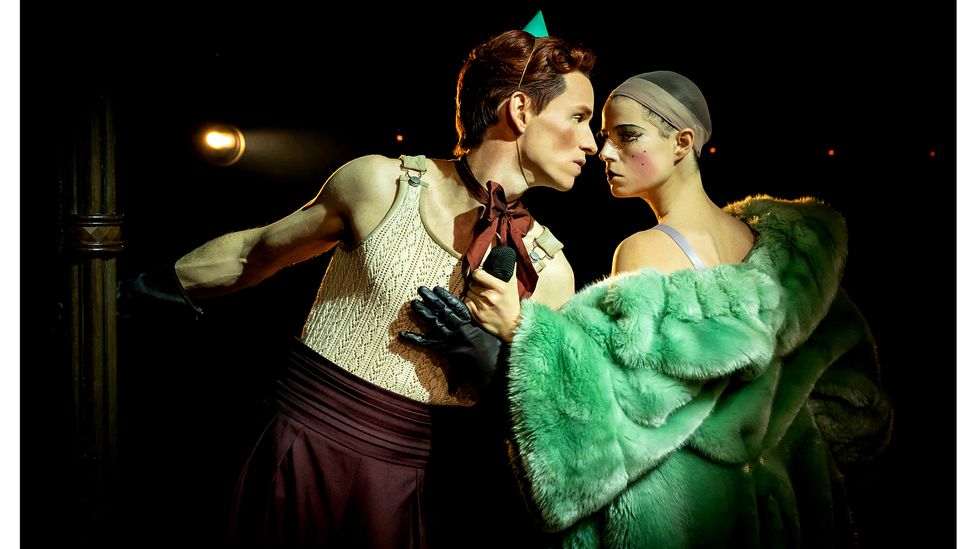
A new stage production of Cabaret starring Eddie Redmayne and Jessie Buckley has been a critical and commercial hit (Credit: Marc Brenner)
York (who reveals he was cast because the producers were looking for a “Michael York type”, meaning slightly quaint and shyly British) says people even questioned why he would want the role, which turned him into one of the biggest stars of the 1970s, underscoring how taboo it was for a mainstream US film to feature any suggestion of gay themes and culture. “All these people were saying I was so brave and that I was taking a terrible risk by playing the role, but I never thought that at all. My job is to represent humanity and [being gay] is a big part of humanity.”
It’s through the androgynous Master of Ceremonies character that Cabaret is at its most unapologetically subversive. Rake-thin, smothered in chalky makeup and adorned in raucous drag, the unnamed character is a pantomime of glorious depravity. He is an absorbing sex magnet, a contorting temptation who struts across the stage like a cross between a flamingo and a marching soldier. Fosse throws the audience into the seediness of the club with gleeful abandon, his camera taking delight in following the Master of Ceremonies as he struts his stuff. The MC is a paradoxical creature: an “other” who would never belong in Nazi Germany, yet who embraces the fascist aesthetic, goosestepping as part of one routine and donning a military helmet and fake gun along with the rest of the performers.
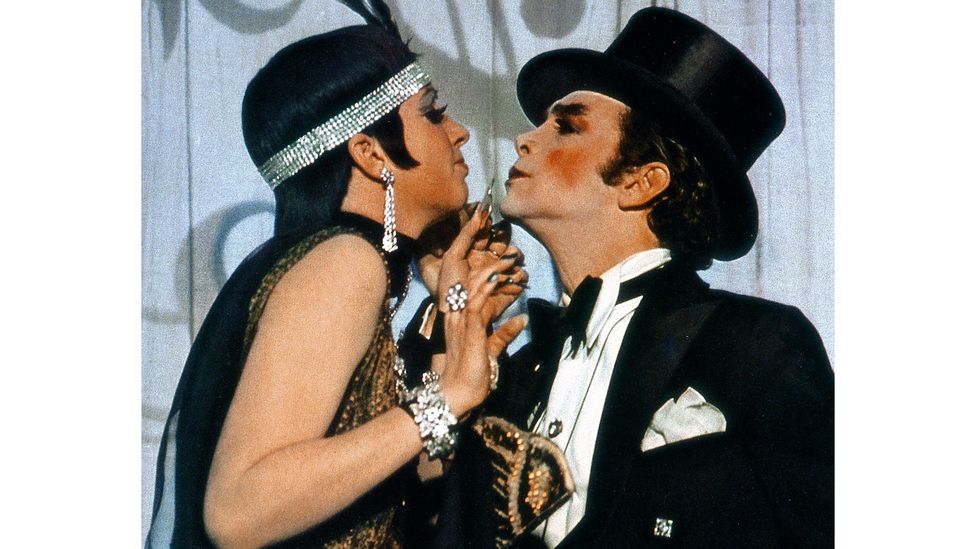
Joel Grey won the Academy Award for best supporting actor for his performance as the Kit Kat Club’s Master of Ceremonies (Credit: Getty Images)
Nazism is the creeping beast in Cabaret, best embodied through the film’s opening and closing scenes, both set in the club where the partygoers think they’re immune to its threat. In the first, the mood is buoyant and the Nazis are merely a background murmur, but by the end, as the Master of Ceremonies completes a reprise of the opening song Willkommen, Fosse shows us the uniformed audience, who are plainly not the club’s usual clientele. The Kit Kat Club is no longer a home for society’s rejects and rebels; it has become the toy of fascism.
Of the darkness of the film’s closing scene, McFadden says: “I always hold my breath at the final image of Sally Bowles, who chooses to stay in Berlin despite the rise of the Nazis and the increasing presence of Nazis in the Kit Kat Klub. You get the impression that she doesn’t think that she will come to harm if she stays. But she will. And it’s the political apathy of people such as Sally that unwittingly helps to facilitate harm to others.”
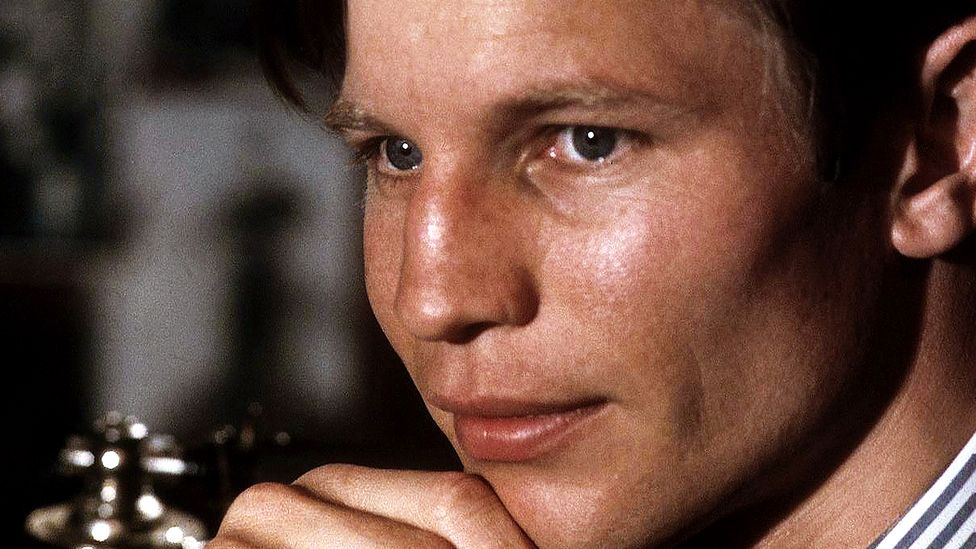
Michael York played Brian Roberts, the film’s stuffy and slightly shocked observer of the chaos – and Isherwood’s alter ego (Credit: Alamy)
Cabaret’s most didactic statement on fascism is also the film’s most iconic sequence. Tomorrow Belongs to Me, the only number in the film set outside of the Kit Kat Club, hits like a sledgehammer as a close-up of a blond boy pans out to reveal that he is a devotee of the Hitler Youth, and the song is a paean to Nazism. McFadden says the song represents “the end of innocence in Germany,” as a child embraces the most evil of ideals, symbolising how the thoughts of one can quickly become the beliefs of many. As the number progresses, the audience, an ordinary group of German people enjoying the sunshine in a beer garden, become enraptured by the promises of Germany’s return to dominance, after the humiliation of Versailles and the destitute inter-war years. The sequence is stark in its reminder that horrors unlike anything humanity had seen before were on the horizon.
“Do you still think you can control them?” Brian says to Max, the German baron who thinks the Nazis are little more than fringe lunatics. As they get into a car and drive away, his words hang in the air, signalling the moment the film finally grows up.
For McFadden, Cabaret stands out not because it depicts homosexuality – other films of the time that did so include Dog Day Afternoon and Midnight Cowboy – nor because it is anti-fascist, but because it was a musical, traditionally the most family-friendly of genres. “Cabaret changed our expectations of what musicals could do,” Tropiano agrees. “[The genre] did not usually deal with adult subject matter. Even the most popular musical – The Sound of Music – which featured Nazis, was a family film.”
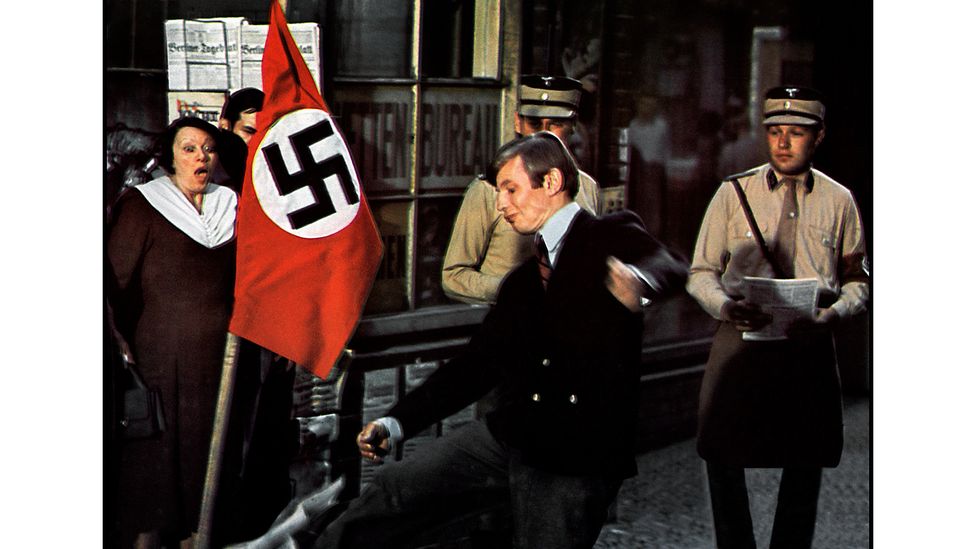
Nazism is the creeping beast in Cabaret – by the film’s end, the Kit Kat Club has become the toy of fascists (Credit: Alamy)
Yet, despite this tackling of complex material and challenging themes, the film was roundly embraced by critics and audiences. Pauline Kael wrote in The New Yorker: “A great movie musical… In a prodigious balancing act, Bob Fosse, the choreographer-director, keeps the period – Berlin, 1931 – at a cool distance. We see the decadence as garish and sleazy; yet we also see the animal energy in it.”
A sign of the times was that Cabaret was also burdened with the dreaded X rating by the British Board of Film Classification, which meant nobody under 17 was allowed to see the film in the UK. When re-rating the film as a 15, 40 years later, the BBFC said it contained “strong sex references, violence and drug references”. As a result of the initial rating, it was not a commercial hit in Britain but was adored by Bafta, where it picked up seven awards from 11 nominations. A burgeoning moral outcry in Britain about sex and violence in cinema perhaps best explains the severity of the rating. Compare the level of explicitness in Cabaret to another X-rated film of 1972 – Alfred Hitchcock’s Frenzy – which features graphic nudity and brutal violence – and it’s very difficult to understand how and why they came to this rating. Conversely, in the US, which re-elected arch conservative Richard Nixon in 1972, the film was granted a PG rating by the MPAA. As a result, Cabaret ended up being the sixth-highest grossing film of the year and won eight Academy Awards (it was beaten to the best picture gong by a little-known film called The Godfather). Against the odds, the US had embraced the queer, anti-fascist film set in a cabaret bar in Berlin.
Fifty years on from Fosse’s film, and Cabaret the musical has been a near-constant in either the West End or on Broadway since the 1980s, attracting stars such as Michelle Williams, Emma Stone and Sienna Miller to the role of Sally. It appears that this dark story of fascism, ambivalence and catastrophic change is eternally relevant. Michael York, born in rural Buckinghamshire during World War Two, is saddened by how contemporary the film can still feel 50 years later. “It’s scary,” he says. “It’s not just because it’s a great film – you can relate it to the political situation of today.” Cabaret is not an overtly pedagogic film – Fosse is certainly no Ken Loach – but its message still haunts.
Love film and TV? Join BBC Culture Film and TV Club on Facebook, a community for cinephiles all over the world.
If you would like to comment on this story or anything else you have seen on BBC Culture, head over to our Facebook page or message us on Twitter.
And if you liked this story, sign up for the weekly bbc.com features newsletter, called The Essential List. A handpicked selection of stories from BBC Future, Culture, Worklife and Travel, delivered to your inbox every Friday.








